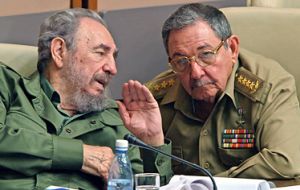MercoPress. South Atlantic News Agency
CIA believes Raul Castro is consolidating as Fidel's successor
 Fidel and his brother Raul Castro
Fidel and his brother Raul Castro The United States government said Tuesday that Raul Castro has consolidated as successor of his brother since last July and admitted that in the event of Fidel's death there will not be an
immediate “positive change”.
"In Cuba, this year will mark the end of the long domination of that country by Fidel Castro" said CIA chief Mike McConnell before Congress. McConnell told the Senate Armed Services Committee that significant positive change immediately after Fidel Castro's death was unlikely. He said Raul Castro has had the opportunity to solidify his control in the seven months since his brother's incapacitating illness. The CIA chief said that time elapsed since Fidel's surgery had given Raul time to consolidate as successor who added that the "post-Fidel transition has begun". As his predecessor in the job John Negroponte, last January, McConnell said that the future of Cuba depended on three basic elements: until what point the government elite cohesion will remain firm without the iconic Fidel around; how wise and canny will Raul prove to be and how much will the people push for economic and political reforms. Separately, the Bush administration official who oversees a White House effort to promote transition to democracy in Cuba said he has seen no indication that the government is getting ready to make any changes. "What has increased is repression," Caleb Charles McCarry said at a seminar at the American Enterprise Institute. Security forces have stepped up harassment of dissidents and have kept closer track of reporters since Fidel Castro transferred control of Cuba's government to his brother after undergoing intestinal surgery last July, the U.S. official said. McCarry said the White House Commission for Assistance for a Free Cuba does "what it can to hasten the day when they can enjoy freedom again. He spoke primarily of broadcasts to Cuba and expressions of support for human rights, and said that only peaceful means are used by the United States. On the job since July 2005, McCarry dismissed any suggestion of U.S. dialogue with Cuba to prepare for transition to democracy. "The dialogue that needs to take place is between Cuban authorities and the Cuban people," he said. Also present at the same seminar US Secretary of Commerce US-Cuban citizen Carlos Gutiérez strongly defended the US embargo policy. Basically he indicated the Bush administration has no intention to relax the travel ban or the partial trade embargo as members of the US Congress have proposed. He also reiterated the rejection of dialogue offered by Raúl Castro. "The problem is the repressive communist system. The only solution is to change the system," Mr Gutierrez said. While Mr Gutierrez stressed the US had "no imperialist intentions" or military plans to occupy Cuba, Roger Noriega a former Bush administration official, said "international intervention" could be necessary if the regime used "deadly force" to survive. Asked if the US would intervene to stop such an outcome, Mr McCarry said he did not answer hypothetical questions. The fall of Castro's 48-year-old government long has been predicted by U.S. officials since the 1959 revolution on the island. Lasted news reports Cuban leader Fidel Castro, in his first live comments since falling ill more than six months ago, declared on Tuesday that he feels "more energetic, stronger" and said his country is running smoothly without him at the helm. Calling in to Venezuelan President Hugo Chavez's radio talk show, Castro said, "I feel good and I'm happy."




Top Comments
Disclaimer & comment rulesCommenting for this story is now closed.
If you have a Facebook account, become a fan and comment on our Facebook Page!